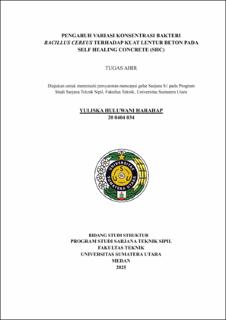Pengaruh Variasi Konsentrasi Bakteri Bacillus Cereus terhadap Kuat Lentur Beton pada Self Healing Concrete (SHC)
The Effect of Variation Bacillus Cereus Bacteria Concentration on Concrete Flexural Strength in Self Healing Concrete (SHC)

Date
2025Author
Harahap, Yuliska Huluwani
Advisor(s)
Handana, Muhammad Agung Putra
Metadata
Show full item recordAbstract
Construction in Indonesia, However, due to several factors such as overloading
and shrinkage, it can cause cracks on the concrete surface, which can damage the structure and
shorten the service life of the concrete. For this reason, self-healing concrete innovation is
needed using Bacillus Cereus bacteria as a substitute for air which aims to heal micro cracks
on the concrete surface. The research method is experimental, carried out in the laboratory with
variations in the addition of Bacillus Cereus bacteria in concentrations of 10², 10⁵, 10⁸ cfu/ml.
This variation will determine the most optimal concentration of adding B.cereus to self-healing
concrete. Based on analysis of the results of the flexural strength test, it shows that concrete
with the addition of B. cereus has a concentration of 10², 10⁵, 10⁸ cfu/ml, and normal concrete
has flexural strength values of 0.73 MPa, 0.91 MPa, 1.94 MPa, and 2.71 MPa. From the SEM
and UPV test results, it was concluded that during the 56 days of observing the bacteria healing
cracks, the bacteria closed the cracks quite significantly, but only in a few segments with a
crack width of no more than 0.3 mm.
Collections
- Undergraduate Theses [1609]
